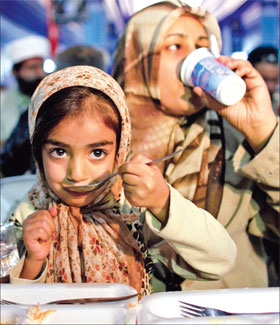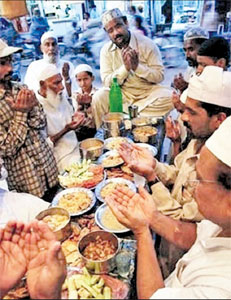 Fasting during Ramazan Fasting during Ramazan
As children get old enough to fast, even for part of the day, they
may also connect the pangs of hunger to the less fortunate throughout
the world. Children should understand that fasting is not a punishment,
but rather it is done willingly for the sake of Allah. It is a personal
act of worship.
Older children may also reflect on what it means to forgive and be
forgiven.
Fasting in Ramazan is the fourth pillar of Islam, which Allah made
obligatory on Muslims in the second year of the Prophet’s migration (Hijrah)
to Madinah: The Holy Quran states“O you who believe, fasting is
prescribed for you as it was prescribed for those before you, so that
you may gain Taqwa (piety)” (2: 183).
 The Messenger of Allah (peace be upon him) said: “He who fasts during
Ramazan with faith and seeking reward from Allah will have his past sins
forgiven.” (Bukhari) Ramazan is a unique opportunity for Muslims to seek
forgiveness and repentance from Allah. It is also a month of opportunity
for enormous reward. As the noble month of Ramazan draws near, it is
relevant for us to look into some of the rulings associated with
fasting. The Messenger of Allah (peace be upon him) said: “He who fasts during
Ramazan with faith and seeking reward from Allah will have his past sins
forgiven.” (Bukhari) Ramazan is a unique opportunity for Muslims to seek
forgiveness and repentance from Allah. It is also a month of opportunity
for enormous reward. As the noble month of Ramazan draws near, it is
relevant for us to look into some of the rulings associated with
fasting.
It is incumbent on Muslims to be aware of Allah’s mandates,
prohibitions, and permissible actions, in order that we worship Allah
with sure sightedness.
Fasting means to abstain from doing something. However, when the
notion of fasting is used in Islamic sharia, it refers to abstaining
from all the things that nullify fasting from the break of dawn (Fajr)
till sunset (Maghrib), coupled with the intention of doing so as an act
of worship. Fasting the month of Ramazan is obligatory (Fard) according
to the Qurân, Sunnah, and consensus of the scholars on every Muslim who
has reached the age of puberty, is sane and is able to fast without it
acting as a threat to one’s health due to illness.
The first pillar of fasting is the intention, and the place of the
intention is the heart. It is mandatory to have the intention at night,
that is, before the break of dawn (Fajr).
This is based on the saying of Prophet Muhammad “Whoever who does not
intend fasting prior to Fajr, then there is no fasting for him.” It is
permissible to make an intention for the whole month at the first
evening of Ramadan. The second pillar of fasting is abstinence;
abstaining from the things that break a person’s fast from the break of
dawn till sunset, along with a continued intention between these two
periods. The third pillar of fasting is the time. That is, one must fast
during the days of Ramazan and not the nights.
Whoever fasts the nights instead of the days, then their fasting is
deemed defective because Allah (s.w.t) says: “Eat and drink until the
white thread (light) of dawn appears to you distinct from the black
thread (darkness of night), then complete your fast till the nightfalls”
Aspects which break the fast

Eating and drinking deliberately: Any Muslim who eats or drinks
intentionally has broken their fast. Whoever does this must repent to
Allah, asking Him for forgiveness. Many Muslim scholars say that he
should also make up this day before the next Ramazan. Imam Abu Hanifah
says that in addition to repenting and the making up the day, he must
also feed a poor or needy person. This view is also attributed to Imam
Malik.Induced vomiting: The soundest view among the scholars of Islam is
that as long as vomiting is unintentional then the fasting remains
valid. The Messenger of Allah said: If someone had a sudden attack of
vomiting, no atonement is required of him, but if he vomits
intentionally he must make atonement. If any vomit is accidentally
swallowed, the fast is not affected. There are a few reasons for adult
women when they are unable to keep the fast. You will learn about this
as you grow older.
Ramazan is a holy month
The month of Ramazan is a month-long observance. It honours the
revelation of the Holy Word to Muhammad.
 During this month, Muslims fast (or don’t eat or drink) for the
entire time the sun is up. At sundown, they have a special meal called
the iftar. During this month, Muslims fast (or don’t eat or drink) for the
entire time the sun is up. At sundown, they have a special meal called
the iftar.
They then go out and visit family and friends.
It is common during Ramazan for Muslims to pray many times during the
day or the night. Prayers are said at least five times a day, and
Ramadan prayers (called Taraweeh) are usually much longer than ordinary
prayers.
On the 27th day of the month of Ramazan, Muslims celebrate the Al-Qadr,
or Night of Power. This is the night on which Allah delivered the Quran
to Muhammad. And, the Quran says, it is on this night that Allah
determines the course of the world for the next year.
After an entire month, Ramazan ends with the feast of Eid-Ul-Fitr.
Friends and families get together for large meals and togetherness. Some
cities have large celebrations. In all, Ramazan is usually a quiet time,
spent mostly in prayer and inner thoughts. Nightly meals are usually
quiet gatherings. The focus is on faith. |


